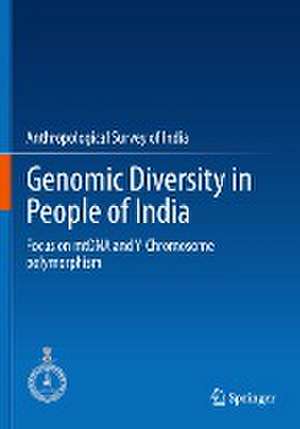Genomic Diversity in People of India: Focus on mtDNA and Y-Chromosome polymorphism
Autor Anthropological Survey Of India Contribuţii de DNA Polymorphism Consortiumen Limba Engleză Paperback – 3 iul 2022
This book highlights the heterogeneous, genetically diverse population of India. It shows how the central geographic location of India, played a crucial role in historic and pre-historic human migrations, and in peopling different continents of the world. The book describes the massive task undertaken by AnSI to unearth genomic diversity of India populations, with the use of Uni-parental DNA markers mtDNA (mitochondrial DNA) and Y –chromosome in 75 communities. The book talks about the 61 maternal and 35 paternal lineages identified through these studies. It brings forth interesting, hitherto unknown findings such as shared mutations between certain communities. This volume is a milestone in scientific research to understand biological diversity of Indian people at genomic level. It addresses the basic priority to identify different genes underlying various inborn genetic defects and diseases specific to Indian populations. This would be highly interesting to population geneticists, historians, as well as anthropologists.
| Toate formatele și edițiile | Preț | Express |
|---|---|---|
| Paperback (1) | 1110.17 lei 6-8 săpt. | |
| Springer Nature Singapore – 3 iul 2022 | 1110.17 lei 6-8 săpt. | |
| Hardback (1) | 1118.94 lei 6-8 săpt. | |
| Springer Nature Singapore – 2 iul 2021 | 1118.94 lei 6-8 săpt. |
Preț: 1110.17 lei
Preț vechi: 1168.60 lei
-5% Nou
Puncte Express: 1665
Preț estimativ în valută:
212.46€ • 230.70$ • 178.46£
212.46€ • 230.70$ • 178.46£
Carte tipărită la comandă
Livrare economică 22 aprilie-06 mai
Preluare comenzi: 021 569.72.76
Specificații
ISBN-13: 9789811601651
ISBN-10: 9811601658
Ilustrații: XXXVII, 431 p. 331 illus., 180 illus. in color.
Dimensiuni: 178 x 254 mm
Greutate: 0.81 kg
Ediția:1st ed. 2021
Editura: Springer Nature Singapore
Colecția Springer
Locul publicării:Singapore, Singapore
ISBN-10: 9811601658
Ilustrații: XXXVII, 431 p. 331 illus., 180 illus. in color.
Dimensiuni: 178 x 254 mm
Greutate: 0.81 kg
Ediția:1st ed. 2021
Editura: Springer Nature Singapore
Colecția Springer
Locul publicării:Singapore, Singapore
Cuprins
Chapter 1. Introduction.- Chapter 2. Mitochondrial Dna Phylogeny In Indian Population.- Chapter 3. Mitochondrial Dna Phylogeny Of N Haplogroup In Indian Population.- Chapter 4. Mtdna 9-Bp Indel Polymorphism (Np8272-8280) Among Indian population.- Chapter 5. Population Diversity and Molecular Diversity Indices based on mtDNA among Indian Population.- Chapter 6. Y-Chromosome Phylogeny In Indian Population.- Chapter 7. Genomic Diversity Of 75 Communities In India.
Notă biografică
The Anthropological Survey of India (AnSI), a premier research organization under the Ministry of Culture, Government of India, is dedicated to map the Bio-Cultural Profile of Indian populations, utilizing manpower specialized in Biological and Cultural Anthropology, Human Ecology, Psychology, Biochemistry, Linguistics and Folklore; developing the organization as launching pad for technology-based research to be applied in human development; understanding, documenting and preparing database and disseminating information about bio-cultural diversity of Indian populations through published research work, seminars, workshops, awareness programmes, outreach programmes, audio-visual documentation, museum documentation; and development of library for facilitating research in anthropology. So far, AnSI has published 43 People of India Volumes, 120 Monographs, 120 Occasional Publications, 6 Coffee Tables Books, 2 Atlas on Scheduled Castes and Scheduled Tribes and 20 publication are in pipeline.
Textul de pe ultima copertă
This book is the output of Anthropological Survey of India's National Project "DNA Polymorphism of Contemporary Indian Population" conducted during 2000 to 2018. The book compiles the independent and collaborative work of 49 scientific personnel. Genomics facilitate the study of genetic constitution and diversity at individual and population levels. Genomic diversity explains susceptibility, predisposition and prolongation of diseases; personalized medicine and longevity; prehistoric demographic events, such as population bottleneck, expansion, admixture and natural selection.
This book highlights the heterogeneous, genetically diverse population of India. It shows how the central geographic location of India, played a crucial role in historic and pre-historic human migrations, and in peopling different continents of the world. The book describes the massive task undertaken by AnSI to unearth genomic diversity of India populations, with the use of Uni-parental DNA markers mtDNA (mitochondrial DNA) and Y –chromosome in 75 communities. The book talks about the 61 maternal and 35 paternal lineages identified through these studies. It brings forth interesting, hitherto unknown findings such as shared mutations between certain communities. This volume is a milestone in scientific research to understand biological diversity of Indian people at genomic level. It addresses the basic priority to identify different genes underlying various inborn genetic defects and diseases specific to Indian populations. This would be highly interesting to population geneticists, historians, as well as anthropologists.
This book highlights the heterogeneous, genetically diverse population of India. It shows how the central geographic location of India, played a crucial role in historic and pre-historic human migrations, and in peopling different continents of the world. The book describes the massive task undertaken by AnSI to unearth genomic diversity of India populations, with the use of Uni-parental DNA markers mtDNA (mitochondrial DNA) and Y –chromosome in 75 communities. The book talks about the 61 maternal and 35 paternal lineages identified through these studies. It brings forth interesting, hitherto unknown findings such as shared mutations between certain communities. This volume is a milestone in scientific research to understand biological diversity of Indian people at genomic level. It addresses the basic priority to identify different genes underlying various inborn genetic defects and diseases specific to Indian populations. This would be highly interesting to population geneticists, historians, as well as anthropologists.
Caracteristici
Reconstructs evolutionary history of human population in India using molecular evidences
Reports and studies the YSNPs markers of 71 communities and mtDNA haplotypes of 48 communities
Presents a database pertaining to genomic diversity of various populations in India
Reports and studies the YSNPs markers of 71 communities and mtDNA haplotypes of 48 communities
Presents a database pertaining to genomic diversity of various populations in India
